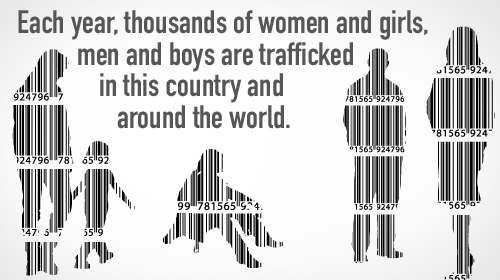
This piece originally ran at on The Boston Globe’s ongoing series “On Liberty.“
“We are worried about the consequences of our decision.”
Today’s utterance by Chief Judge Sandra Lynch, of the First Circuit Court of Appeals, gives me hope that the court will do justice for the victims of human trafficking who will be impacted by how the First Circuit rules in a case argued before it this morning.
The case, American Civil Liberties Union of Massachusetts v. Sebelius, raises the critical issue of whether the federal government violated the First Amendment when it delegated the spending of federal dollars to a religious institution which, in turn, used those federal funds to impose its unique religious restrictions on medical services offered to victims of human trafficking.
The facts of the case are compelling. Each year, thousands of women and girls, men and boys are trafficked in this country and around the world, enduring the most horrific conditions imaginable. They are often beaten, brutally raped, forced into prostitution, and required to live in inhumane conditions. Many trafficked women, girls, and boys are subjected to forced sex multiple times a day, putting them at risk for unintended pregnancies and sexually transmitted infections. Upon escape from their traffickers, many of these women, girls, and boys need access to an array of medical services, including abortion services, contraception, and testing and treatment for HIV and sexually transmitted infections.
So horrific is the plight of trafficking victims that in 2000, Congress passed the Torture Victims Protection Act (TVPA), authorizing the Department of Health and Human Services (HHS) to provide grants and contracts to medical providers to help victims of trafficking.
For five years, the program worked well. But in 2005, the Bush Administration’s HHS stopped giving these grants to social service providers directly and, instead, installed the U.S. Conference of Catholic Bishops as the middle-man to give away the money for the federal government.
It’s bad enough that the Catholic Bishops skimmed off 30 percent of the money to pay for people to monitor and enforce its religious restrictions and other “overhead” (more than the 20 percent it was permitted to take under the statute). But the Catholic Bishops also announced that, “As a Catholic organization, we need to ensure that our victim services are not used to refer or fund activities that would be contrary to our moral convictions and religious beliefs. Specifically, subcontractors could not provide or refer for abortion services or contraception materials.”
When pressed, the Catholic Bishops made it clear that religion–and religion alone–was its sole reason to deny grants to groups who provide contraception and abortion counseling and referral services to women and children who have been raped and brutalized.
As a constitutional matter, I have no problem with the Catholic Bishops–or any other religious institution–embracing and enforcing its religious beliefs on its own adherents.
But I have a big problem when federal dollars are given to a church–or any other religious institution–to compel victims to adhere to that church’s religious belief.
Here, the situation is even worse than proselytizing–it’s actually forcing torture victims to adhere to Catholic religious tenets that frown on contraception and abortion, at a time when they most need these legal medical services.
For this reason, the federal trial court–in an eloquent and compelling decision by Judge Stearns–ruled in March that the federal government did, in fact, violate the First Amendment’s Establishment Clause (aka “separation of church and state”) when it permitted the Catholic Bishops to impose their will on social service providers and trafficking victims.
Today, on appeal, the three judges on the First Circuit focused on technical legal arguments, such as whether taxpayers have “standing” to challenge the program and whether the case became moot after the Obama administration let the grant expire (although HHS is still funneling similar grants with similar religious restrictions through the Catholic Bishops).
I hope the Court doesn’t hide behind technical legalisms.
If “bad facts make bad law,” as Supreme Court Justice Louis Brandeis famously wrote, you’d like to think that these enormously compelling facts would result in good law. The judges are correct to be worried about the “consequences of their decisions,” because real human lives are at stake.
The standard should be doing justice which, in this case, clearly falls on the side of upholding the lower court ruling and defending the rights of American taxpayers, religious liberty, and victims of human trafficking.
Learn more about human trafficking: Sign up for breaking news alerts, follow us on Twitter, and like us on Facebook.




